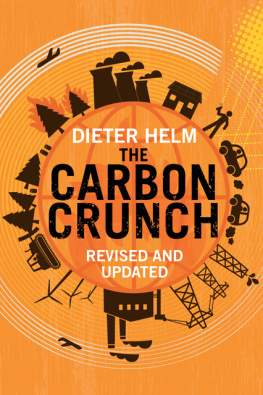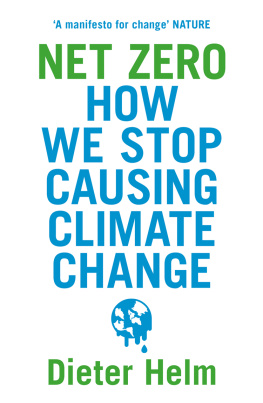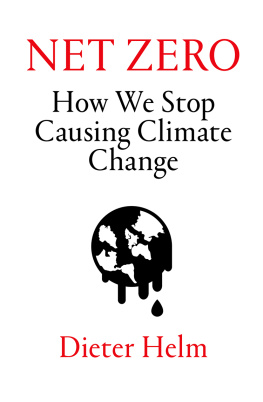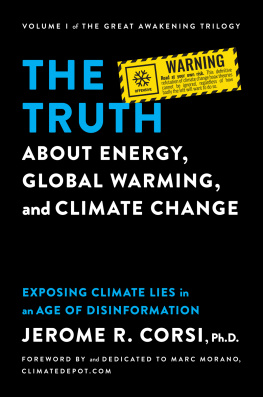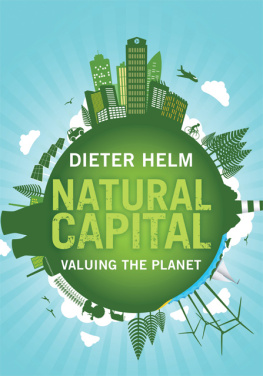THE CARBON CRUNCH
Revised and Updated Edition
Dieter Helm, CBE, is Professor of Energy Policy, University of Oxford, Fellow in Economics at New College, Oxford, and Professorial Research Fellow at the Smith School of Enterprise and the Environment, Oxford. He is Chair of the worlds first Natural Capital Committee.

Copyright 2012 Dieter Helm
This paperback edition first published 2015
The right of Dieter Helm to be identified as author of this work has been asserted by him in accordance with the Copyright, Designs and Patents Act 1988.
All rights reserved. This book may not be reproduced in whole or in part, in any form (beyond that copying permitted by Sections 107 and 108 of the U.S. Copyright Law and except by reviewers for the public press) without written permission from the publishers.
For information about this and other Yale University Press publications, please contact:
U.S. Office:
Europe Office:
Set in Minion Pro by IDSUK (DataConnection) Ltd
Printed in Great Britain by TJ International Ltd, Padstow, Cornwall
Library of Congress Cataloging-in-Publication Data
Helm, Dieter.
The carbon crunch / Dieter Helm.Revised and updated edition.
pages cm
Includes bibliographical references and index.
ISBN 978-0-300-21532-8
1. Energy policy. 2. Renewable energy sources. 3. Energy conservation. 4. Climatic changesPrevention. 5. Greenhouse gas mitigation. I. Title.
HD9502.A2H455 2015
333.79dc23
2015000657
A catalogue record for this book is available from the British Library.
ISBN 978-0-300-21532-8 (pbk)
10 9 8 7 6 5 4 3 2 1
Contents
Figures and tables
Abbreviations
AGR, advanced gas-cooled nuclear reactor
BRICS, Brazil, Russia, India, China, South Africa
CAFE, Corporate Average Fuel Economy
CCGT, combined-cycle gas turbine
CCS, carbon capture and storage
CDM, Clean Development Mechanism
CEGB, Central Electricity Generating Board
CER, Certified Emissions Reduction
CND, Campaign for Nuclear Disarmament
CO, carbon monoxide
CO2, carbon dioxide
CO2e, carbon dioxide equivalence (i.e., including all greenhouse gases)
CSP, concentrated solar power
CTL, coal-to-liquids
EIA, US Energy Information Administration
EU ETS, European Union Emissions Trading Scheme
FGD, flue-gas desulphurization
FiT, feed-in tariff
GDP, Gross Domestic Product
GW, gigawatt
IAM, integrated assessment model
IEA, International Energy Agency
IEM, internal energy market
IMF, International Monetary Fund
IPCC, Intergovernmental Panel on Climate Change
ITF, International Transport Forum
kWh/d, kilowatt-hour per day
LCPD, EU Large Combustion Plant Directive
LNG, liquefied natural gas
MIT, Massachusetts Institute of Technology
MMBtu, million British thermal units
MW, megawatt
NGO, non-governmental organization
NOx, nitrogen oxides
NPV, net present value
OPEC, Organization of Petroleum Exporting Countries
ppm, parts per million
PV, photovoltaics
PWR, pressurized water nuclear reactor
R&D, research and development
REDD, Reducing Emissions from Deforestation and Forest Degradation
ROC, Renewables Obligation Certificate
SOx, sulphur oxides
SPD, Social Democratic Party of Germany
SUV, sports utility vehicle
UEA, University of East Anglia
UNFCCC, United Nations Framework Convention on Climate Change
WTO, World Trade Organization
Preface to the revised and
updated edition
This book was always going to be controversial, and so it has proved. It is designed to be a wake-up call, drawing attention to the fact that very little has been achieved in addressing climate change in the last two decades. The sad fact is that, contrary to most political rhetoric, world leaders (and many non-governmental organizations NGOs and lobbyists) have not come to terms with the nature of the problem, and the flurries of diplomatic activity and major conferences have made little progress.
The underlying position continues to deteriorate. In 2012, another 2 parts per million (ppm) of carbon dioxide (CO2) were added to the atmosphere, followed by another 2.8 ppm in 2013 and roughly the same again in 2014. Roll forward to 2030 and the total will be close to 450 ppm, up from the current 400, and close to twice the pre-industrial levels a Paris agreement notwithstanding. Coal power stations have continued to be built on an enormous scale in China and India. Indeed Europe and notably Germany has been back in the new coal power stations business again, and mining yet more lignite too. Though some action has been taken to reduce the overhang of emissions credits, the European Unions Emissions Trading Scheme (EU ETS) remains pathetically weak, with a carbon price too low to make much difference.
The international negotiations in the run-up to the Paris conference in 2015 have kept lots of bureaucrats and campaigners busy, but still offer little hope of significant progress. China will go on increasing its emissions until 2030, and India is likely to peak even later. In the meantime, consumers fret about their energy bills, and are beginning to mount the inevitable backlash against the renewables policies that they were told would not cost them much. Politicians are as a result scrambling to cut subsidies for current renewables, reinforced by fossil fuel prices which stubbornly refuse to rise as the politicians so confidently predicted, and instead follow the inevitable economic path dictated by supply and demand.
Being controversial, it is not surprising that the first edition attracted some fierce responses, notably from green NGOs. Rather than attack the first part of the book (on causes and responsibilities) or the analysis in the second part (on why current policies and the Kyoto framework have failed to make any serious dent in the growth of emissions), they have targeted the implications in the third part, on what should be done. In particular, it is the proposals on carbon pricing, on gas as a transitionary fuel, and on future renewables and R&D that have been challenged.
On carbon pricing, a number of critics have taken issue with the proposal for border carbon taxes, claiming that this is unrealistic. My argument is that this is what would be required if we seriously want to tackle climate change. Sadly, the evidence thus far is that few, if any, countries really want to do what is necessary to address climate change. If it is agreed that a carbon price is a necessary part of any coherent carbon policy framework, and that what matters is not carbon production but carbon consumption, then border taxes are the natural next step. Critics have also failed to note the underpinnings of my argument for border taxes including the fact that there are lots of border adjustments already in place, and the ways in which the threat of border taxes might incentivize both the US and China to act faster. A border tax approach helps to encourage the US to develop a carbon tax domestically, and China to play up its own carbon pricing. No serious progress will be made without the US and China and, despite all the hype about the Paris negotiations, very little has in fact been made to date. On the contrary, China has decided as its opening gambit not to legally commit to a cap on its emissions until 2030, something which will probably happen by then anyway.
Perhaps the fiercest reactions have been focused on my argument that gas can and should play a key role as a transitionary fuel, replacing coal in the short term. The green NGOs and green political parties have led the way in trying to ban fracking. They are strongly supported by vested interests notably those benefiting from current subsidies for renewables.
Next page
